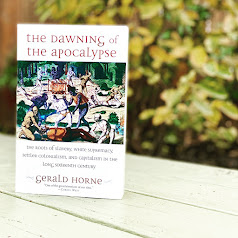[Gerald Horne. The Dawning of the Apocalypse: The Roots of Slavery, White Supremacy, Settler Colonialism, and Capitalism in the Long Sixteenth Century. New York: Monthly Review Press, 2020.]
Historical scholarship. A sweeping history of the long sixteenth century, from the first voyage of Columbus in 1492 to the establishment of the first permanent English-speaking settlement in North America in 1607. Though it was really in the seventeenth century that it became clear that all of these interlinked phenomena would become the defining features of the historical trajectory that we are still on today, the long sixteenth century lay the groundwork for what slavery, whitesupremacy, settler colonialism, and capitalism would later become.
My reading experience with this book was a little peculiar. Partly, that's on me – I didn't really know much about the time period, and this book covers a lot of ground quite quickly, so there were sometimes allusions to events and people and so on that I couldn't keep up with. But the writing is also a bit strange, in that the author tends to repeat core ideas a lot in a way that goes way beyond the judicious repetition you expect in careful scholarship, and even specific facts and phrases keep recurring in a way that feels odd. (Can any book bear multiple references to France as "the hexagonal kingdom", for instance? This one certainly tried!) And I couldn't always determine what was about my reading and what was about the writing, but I wasn't always able to follow the logic of its movements across time and space.
All of that said, it is fascinating history and, I think, important analysis. I won't try to summarize it all, but one key theme is how the events of this century set the stage for the shift in the balance of world power from Spain to England. There were lots of elements to this, including the ways in which conflict with Protestant and Muslim nations (plus sometimes France) in the east and Indigenous and enslaved African resistance in the west depleted Spain and allowed England, as a relative latecomer to the imperial game in the so-called New World, to swoop in as opportunity presented. But one of the most important is how Spain remained committed to an approach to empire that pivoted around religion, such that it excluded (if imperfectly) Protestant and Jewish people from its settlements and alliances, thus weakening it, whereas differences in England's circumstance meant it was better positioned to move forward with the emerging pan-European, ecumenical, inter-faith, and inter-ethnic solidarity that is whiteness/white supremacy, which ultimately proved to be a more powerful basis for settler colonialism and empire than Catholicism.
I was also interested to learn about the role that conflict with the Ottomans played in this moment. Christian Europe was losing to them pretty consistently for much of the sixteenth century, which gave urgency to early European efforts to drain whatever resources it could from the New World. As well, the book argues that whiteness was not only a more apt technology for a settler colonial extractive empire than religion, but that Christian anti-Islamic militancy – its fervour and violence, and the form that it took through the Crusades – was itself part of what was transmuted into whiteness.
There were other interesting bits and pieces too...things like the way that the constant warfare within Europe itself in this era drove the development of weapons technology, which was of course important in how things played out as Europe pointed its violent tendencies at the rest of the world. I also hadn't really appreciated before the way that slavery was transformed in this era – it was still, at the beginning of the sixteenth century, a pretty multi-directional practice, with European Christians enslaving Muslims and vice versa over the course of their centuries of reciprocal warfare. The tight and violently racialized association of slavery with African-descended people only emerged as European states became dependent on maximizing accumulation from the pillaging of the New World, and mass kidnapping from Africa was the way they decided to do it (which of course also corresponded with race displacing religion as the dominant sense of "we" in Europe). I also really appreciated the book's copious attention to resistance, particularly by African and Indigenous North American people.
Anyway...a bit of a weird book in some ways, but also an interesting and important one.




No comments:
Post a Comment